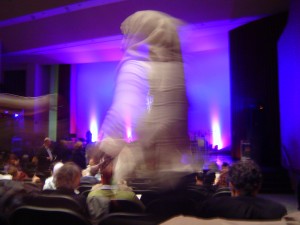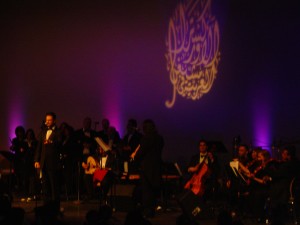
The Michigan Arab Orchestra performs at Wayne State
With considerable shame, I must confess my experience with “Middle Eastern music,” if such an enormous and diverse cultural heritage can be reduced to that designation, comes almost entirely from brief fragments heard through tinny radios in the back of specialty grocery stores or as ambience in the background of restaurants. This is why I jumped at the opportunity to see a performance by the Michigan Arab Orchestra. The group was initially founded in 2009 as a small chamber music group known as a takht, but it is now a full orchestra under the guidance of musical director Michael Ibrahim. The concert took place in the Community Arts Auditorium at Wayne State University this past Friday, Jan. 27.
When I hear the word orchestra, I reflexively define it in Western terms, as classical in a specific, subdued sense. But this music was more jazz than classical, more Joe Henderson or Duke Ellington than Franz Schubert. The rhythm section kicked out beats that had the packed audience dancing and clapping, and the many instrumental improvisations inspired hollering and call-and-response reactions from the crowd. It was an exhilarating and pleasurable event, and the audience played a critical role as an active collaborator in the music. After the program, I learned the orchestra specializes in “tarab” music, a style of play that emphasizes both improvisation and audience participation.
The mission of the Michigan Arab Orchestra is to preserve and promote the classical and contemporary traditions of its cultural heritage. One of the speakers introducing the orchestra began her remarks with, “If you want to connect with a people, listen to their music.” This got me thinking about culture, which is essentially just what continues to exist — despite the passage of time, despite the pressures of commerce, despite the inevitable chaos that threatens to consume each and every generation. A fundamental culture is what remains, simply because its continued existence is so crucially important that people refuse to let it vanish. This is, perhaps, the bedrock of civilization.
Ali F. Beydoun, the charismatic founder and president of the Arab Student Union at Wayne State — the largest Arab student association in the country — spoke at length about the importance of the Michigan Arab Orchestra, not only in preserving a musical heritage, but in promoting understanding and integration of the Arab culture within the United States; a task, I can only imagine, that is besieged by difficulties and prejudice at every turn. And yet Beydoun seemed a veritable beacon of happiness and enthusiasm —brimming with optimism and self-assurance — which I’m sure had a great deal to do with the strength of the attending community, whose joy radiated irresistibly throughout the performance.
I’ve included a video from one of the orchestra’s recent performances, and there are many more on its YouTube page, but I can’t emphasize enough how terrific the live performance is, so please don’t let these recordings stand in for firsthand experience.
Michigan Arab Orchestra, 586-354-1576, [email protected], michiganaraborchestra.org.
Recent Content
-
Artsarticle ·
-
Artsarticle ·
-
Artsarticle ·


